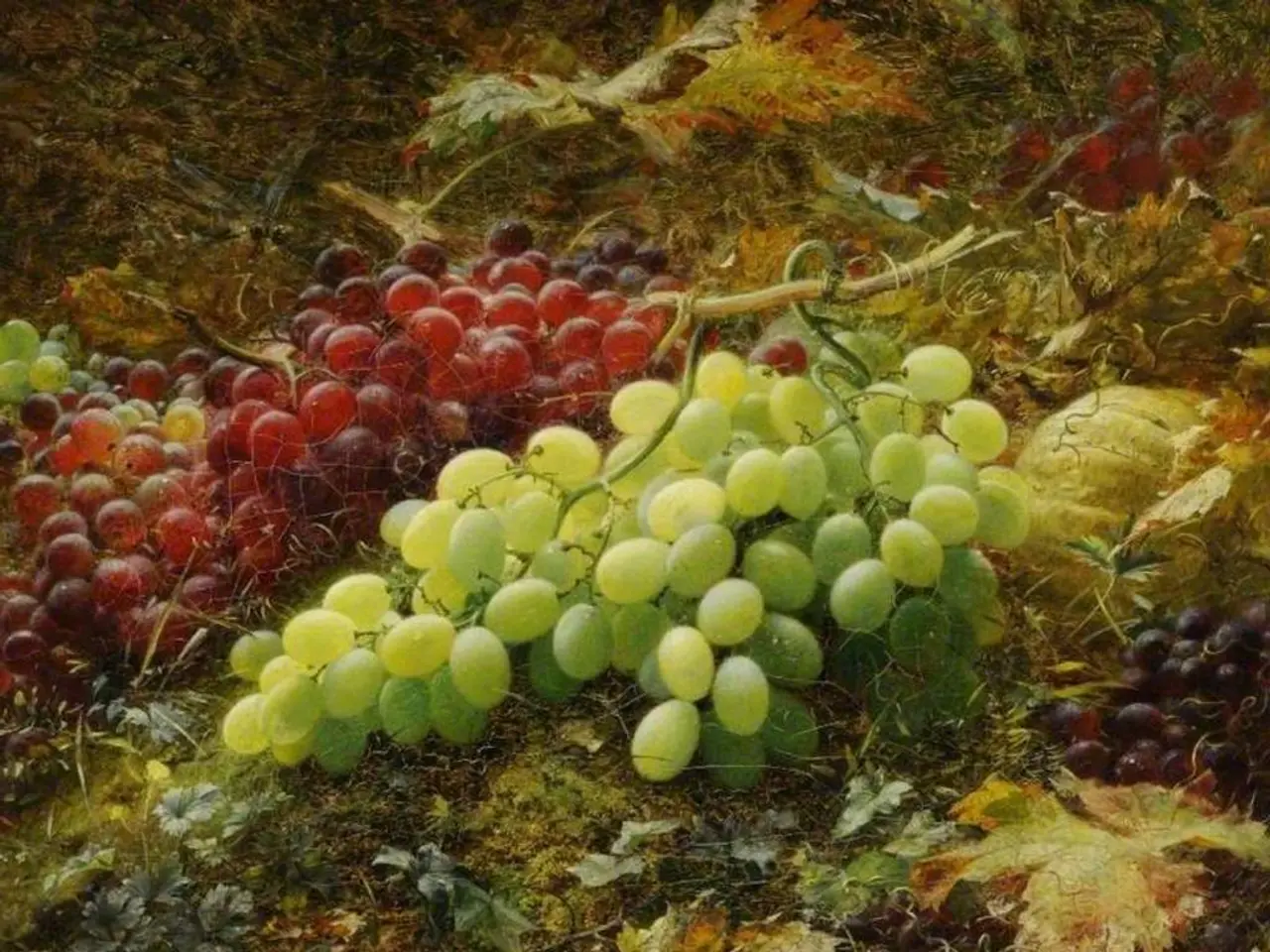Guide for cultivating grapes:
In the heart of the British countryside, growing grapes may seem like a daunting task given the country's unpredictable climate. However, with the right choice of grape varieties and careful cultivation practices, both outdoors and in greenhouses, it is feasible to cultivate these delicious fruits in the UK.
**Suitable Grape Varieties for the UK**
Early-ripening and hardy grape varieties are best suited for the UK's marginal climate, especially those that can tolerate cooler temperatures and shorter growing seasons typical of much of the UK. Popular varieties for outdoor cultivation in the UK include 'Solaris', 'Rondo', 'Orion', and 'Phoenix', all bred for disease resistance and cold tolerance, making them more reliable in unpredictable UK weather. For greenhouse cultivation, you can also grow more delicate varieties like 'Muller-Thurgau' or 'Muscat Hamburg', which benefit from the warmer, controlled environment.
**Location and Soil**
Choose a spot with free-draining soil and good air circulation to reduce the risk of disease. South-facing slopes with chalky or limestone soils, like those found in parts of southern England, are ideal for grapevines as they reflect warmth and drainage is excellent[1][3][5]. Avoid low-lying areas prone to frost pockets.
**Outdoor Cultivation Care Instructions**
Plant vines in spring after the last frost. Train vines along wires or canes to maximize sun exposure. Protect vines from birds and pests using netting because these are a significant challenge in the UK[1]. In wetter and cooler seasons, monitor for fungal diseases like powdery mildew and apply appropriate preventive treatments. Prune vines annually in winter to maintain air flow and encourage fruitful shoots. Mulch around the base to conserve moisture but avoid waterlogging roots. Consider using sustainable viticulture practices, including minimal chemical use and composting, to improve soil organic matter and moisture retention, which can help vines cope with climatic stress[1][4].
**Greenhouse Cultivation Care Instructions**
Use a heated greenhouse if possible to ensure ripening of more tender varieties. Maintain good ventilation to prevent humidity build-up and fungal diseases. Grow vines in large pots or grow bags with well-draining soil rich in organic matter. Regular watering is critical, but avoid waterlogging. Feed with a balanced fertilizer during the growing season to promote healthy growth and fruit development. Artificial lighting can support growth in darker months but may not be essential in summer. Prune and train vines carefully to optimize space and light.
**Summary Table**
| Cultivation Aspect | Outdoor UK Vineyards | Greenhouse Cultivation | |----------------------|---------------------------------------------|--------------------------------------| | Ideal Varieties | Solaris, Rondo, Orion, Phoenix | Muller-Thurgau, Muscat Hamburg | | Soil Type | Free-draining, chalky/limestone preferred | Well-draining, fertile potting mix | | Climate Challenges | Unpredictable weather, pests, birds | Control temperature and humidity | | Disease Management | Prevent fungal diseases with treatments | Keep good ventilation and sanitation | | Pest Protection | Bird netting, pest monitoring | Fewer pests, monitor carefully | | Watering | Moderate, avoid waterlogging | Regular, consistent watering | | Pruning | Annual winter pruning to manage growth | Frequent pruning to control size |
Growing grapes in the UK requires careful site selection, choosing hardy grape varieties suited to cool climates, and vigilant care against pests and diseases. Sustainable viticulture is possible but remains a balancing act given the UK's variable weather[1][3].
For best results, outdoor growers should focus on early-ripening, disease-resistant cultivars and site conditions, while greenhouse cultivators can experiment with more tender varieties, benefiting from the controlled environment. Grapevines should be planted 15cm away from walls or fences. Grapevines benefit from an annual mulch of well-rotted manure or garden compost. Grapevines make attractive climbers for walls and fences. Grapevines can be grown successfully in greenhouses for better fruit results. Grapes are ready to pick when they are fully colored and taste ripe, allowing for a taste test. Vitis vinifera 'Poloske muscat' is a green grape plant that is mildew resistant, produces lots of fruit, and can be grown outdoors in most of the UK. Grey mould can affect grapevines in wet conditions or poor air circulation, affecting buds, leaves, and fruit, and can be fatal for weak or damaged plants. Powdery mildew affects the growth of grapevine leaves and some varieties are mildew resistant. Red spider mites can cause leaves to become pale and covered in webbing in greenhouses, with biological controls available. Grapevines require pruning to save space on the ground. Grapes, specifically Vitis vinifera, can thrive in warmer parts of the UK.
[1] RHS (2021) Growing Grapes: A Practical Guide. Retrieved from https://www.rhs.org.uk/advice/profile?PID=411 [2] Horticulture Week (2020) The state of the UK vineyard industry. Retrieved from https://www.hortweek.com/news/3060357/the-state-of-the-uk-vineyard-industry [3] Defra (2019) UK Climate Projections. Retrieved from https://ukclimateprojections.metoffice.gov.uk/ [4] Soil Association (2021) Sustainable Viticulture. Retrieved from https://www.soilassociation.org/organic-farming/farming-systems/viticulture/ [5] WineGB (2021) Vineyard Location. Retrieved from https://winegb.co.uk/vineyards/vineyard-location/
In the UK, home-and-garden enthusiasts can cultivate grapes successfully by focusing on early-ripening, disease-resistant grape varieties like 'Solaris', 'Rondo', 'Orion', and 'Phoenix' for outdoor cultivation. For a more controlled environment, varieties such as 'Muller-Thurgau' or 'Muscat Hamburg' can be grown in greenhouses. Gardening practices, such as providing free-draining soil, good air circulation, and implementing sustainable viticulture methods, are essential for grape cultivation in the UK.




